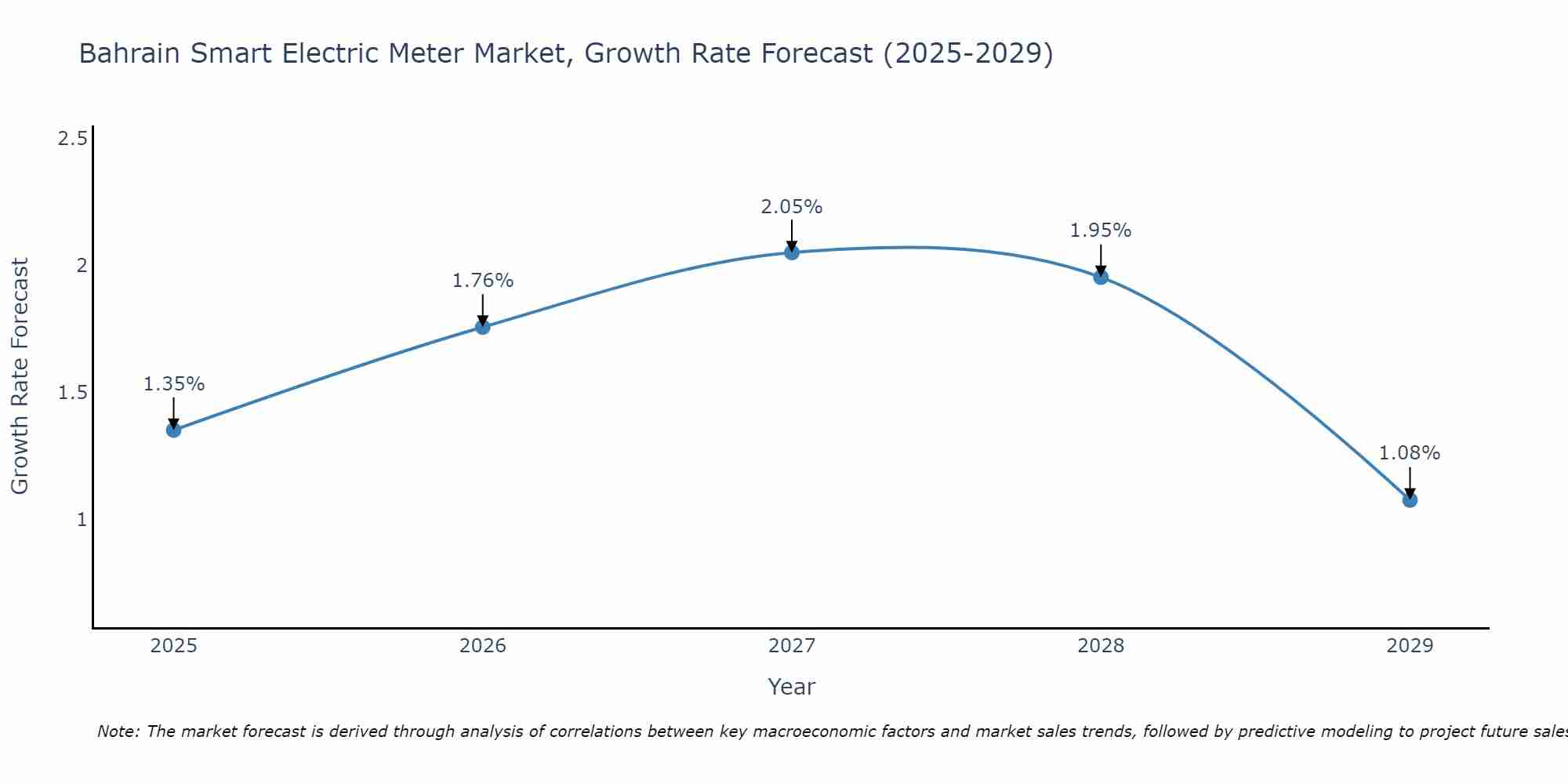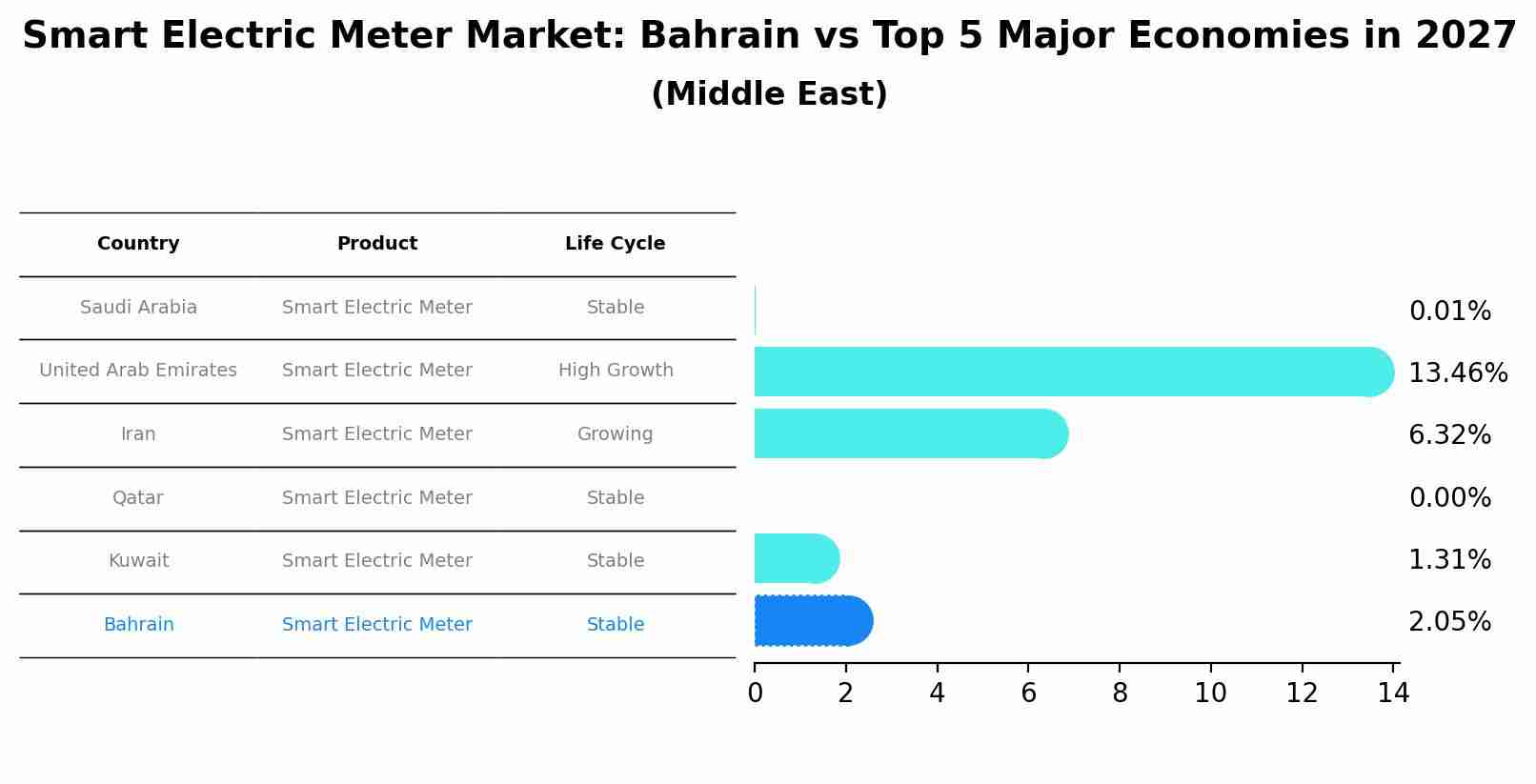Bahrain Smart Electric Meter Market Outlook | COVID-19 IMPACT, Forecast, Revenue, Value, Growth, Analysis, Companies, Trends, Size, Share & Industry
| Product Code: ETC369344 | Publication Date: Aug 2022 | Updated Date: Apr 2025 | Product Type: Market Research Report | |
| Publisher: 6Wresearch | Author: Ravi Bhandari | No. of Pages: 75 | No. of Figures: 35 | No. of Tables: 20 |
Bahrain Smart Electric Meter Market Size Growth Rate
The Bahrain Smart Electric Meter Market is projected to witness mixed growth rate patterns during 2025 to 2029. The growth rate begins at 1.35% in 2025, climbs to a high of 2.05% in 2027, and moderates to 1.08% by 2029.

Smart Electric Meter Market: Bahrain vs Top 5 Major Economies in 2027 (Middle East)
In the Middle East region, the Smart Electric Meter market in Bahrain is projected to expand at a stable growth rate of 2.05% by 2027. The largest economy is Saudi Arabia, followed by United Arab Emirates, Iran, Qatar and Kuwait.

Bahrain Smart Electric Meter Market Synopsis
The smart electric meter market in Bahrain is evolving rapidly as part of the countrys shift toward digital utilities and energy efficiency. These meters enable real-time energy monitoring, reduce manual errors, and support demand-side management. National grid modernization and the adoption of renewable energy sources are key factors fueling market growth.
Trends of the market
Bahrains smart electric meter market is experiencing rapid expansion as part of the countrys shift toward smart grids and energy-efficient infrastructure. The governments commitment to energy reform and digital transformation has accelerated the deployment of smart meters, which offer real-time consumption data and support better demand management. Consumer interest in sustainability and energy cost savings is further stimulating growth in residential and commercial sectors.
Challenges of the market
The Bahrain Smart Electric Meter Market is growing with the push for grid modernization and energy efficiency. Smart meters enable real-time monitoring and billing transparency, helping utilities and consumers manage energy consumption. However, the market faces challenges like cybersecurity risks, resistance to change from traditional meter users, and interoperability issues with existing infrastructure. High initial costs and the need for skilled technicians for installation and data analytics also slow down widespread deployment.
Investment opportunities in the Market
With the push for smarter utilities and energy efficiency, smart electric meters are becoming increasingly popular. Investors can partner with energy companies, municipalities, and contractors to supply and install smart metering solutions that include real-time data monitoring and analytics, offering both hardware and software solutions.
Government Policy of the market
Smart electric meters are central to Bahrains national energy management reform. Under the Bahrain Electricity and Water Authority (EWA), government policy mandates the rollout of advanced metering infrastructure (AMI) across residential, commercial, and industrial sectors. The digitalization of utility services aligns with Bahrains Vision 2030 goals for sustainability and smart infrastructure, and policies require smart meters to adhere to interoperability, cybersecurity, and consumer data privacy standards.
Key Highlights of the Report:
- Bahrain Smart Electric Meter Market Outlook
- Market Size of Bahrain Smart Electric Meter Market, 2021
- Forecast of Bahrain Smart Electric Meter Market, 2031
- Historical Data and Forecast of Bahrain Smart Electric Meter Revenues & Volume for the Period 2018 - 2031
- Bahrain Smart Electric Meter Market Trend Evolution
- Bahrain Smart Electric Meter Market Drivers and Challenges
- Bahrain Smart Electric Meter Price Trends
- Bahrain Smart Electric Meter Porter's Five Forces
- Bahrain Smart Electric Meter Industry Life Cycle
- Historical Data and Forecast of Bahrain Smart Electric Meter Market Revenues & Volume By Phase for the Period 2018 - 2031
- Historical Data and Forecast of Bahrain Smart Electric Meter Market Revenues & Volume By Single for the Period 2018 - 2031
- Historical Data and Forecast of Bahrain Smart Electric Meter Market Revenues & Volume By Three for the Period 2018 - 2031
- Historical Data and Forecast of Bahrain Smart Electric Meter Market Revenues & Volume By Communication Technology Type for the Period 2018 - 2031
- Historical Data and Forecast of Bahrain Smart Electric Meter Market Revenues & Volume By Power Line Communication (PLC) for the Period 2018 - 2031
- Historical Data and Forecast of Bahrain Smart Electric Meter Market Revenues & Volume By Radio Frequency (RF) for the Period 2018 - 2031
- Historical Data and Forecast of Bahrain Smart Electric Meter Market Revenues & Volume By Cellular for the Period 2018 - 2031
- Historical Data and Forecast of Bahrain Smart Electric Meter Market Revenues & Volume By End-Users for the Period 2018 - 2031
- Historical Data and Forecast of Bahrain Smart Electric Meter Market Revenues & Volume By Industrial for the Period 2018 - 2031
- Historical Data and Forecast of Bahrain Smart Electric Meter Market Revenues & Volume By Commercial for the Period 2018 - 2031
- Historical Data and Forecast of Bahrain Smart Electric Meter Market Revenues & Volume By Residential for the Period 2018 - 2031
- Bahrain Smart Electric Meter Import Export Trade Statistics
- Market Opportunity Assessment By Phase
- Market Opportunity Assessment By Communication Technology Type
- Market Opportunity Assessment By End-Users
- Bahrain Smart Electric Meter Top Companies Market Share
- Bahrain Smart Electric Meter Competitive Benchmarking By Technical and Operational Parameters
- Bahrain Smart Electric Meter Company Profiles
- Bahrain Smart Electric Meter Key Strategic Recommendations
Frequently Asked Questions About the Market Study (FAQs):
- Single User License$ 1,995
- Department License$ 2,400
- Site License$ 3,120
- Global License$ 3,795
Search
Thought Leadership and Analyst Meet
Our Clients
Related Reports
- Canada Oil and Gas Market (2026-2032) | Share, Segmentation, Value, Industry, Trends, Forecast, Analysis, Size & Revenue, Growth, Competitive Landscape, Outlook, Companies
- Germany Breakfast Food Market (2026-2032) | Industry, Share, Growth, Size, Companies, Value, Analysis, Revenue, Trends, Forecast & Outlook
- Australia Briquette Market (2025-2031) | Growth, Size, Revenue, Forecast, Analysis, Trends, Value, Share, Industry & Companies
- Vietnam System Integrator Market (2025-2031) | Size, Companies, Analysis, Industry, Value, Forecast, Growth, Trends, Revenue & Share
- ASEAN and Thailand Brain Health Supplements Market (2025-2031) | Strategy, Consumer Insights, Analysis, Investment Trends, Opportunities, Growth, Size, Share, Industry, Revenue, Segments, Value, Segmentation, Supply, Forecast, Restraints, Outlook, Competition, Drivers, Trends, Demand, Pricing Analysis, Competitive, Strategic Insights, Companies, Challenges
- ASEAN Bearings Market (2025-2031) | Strategy, Consumer Insights, Analysis, Investment Trends, Opportunities, Growth, Size, Share, Industry, Revenue, Segments, Value, Segmentation, Supply, Forecast, Restraints, Outlook, Competition, Drivers, Trends, Demand, Pricing Analysis, Competitive, Strategic Insights, Companies, Challenges
- Europe Flooring Market (2025-2031) | Outlook, Share, Industry, Trends, Forecast, Companies, Revenue, Size, Analysis, Growth & Value
- Saudi Arabia Manlift Market (2025-2031) | Outlook, Size, Growth, Trends, Companies, Industry, Revenue, Value, Share, Forecast & Analysis
- Uganda Excavator, Crane, and Wheel Loaders Market (2025-2031) | Strategy, Consumer Insights, Analysis, Investment Trends, Opportunities, Growth, Size, Share, Industry, Revenue, Segments, Value, Segmentation, Supply, Forecast, Restraints, Outlook, Competition, Drivers, Trends, Demand, Pricing Analysis, Competitive, Strategic Insights, Companies, Challenges
- Rwanda Excavator, Crane, and Wheel Loaders Market (2025-2031) | Strategy, Consumer Insights, Analysis, Investment Trends, Opportunities, Growth, Size, Share, Industry, Revenue, Segments, Value, Segmentation, Supply, Forecast, Restraints, Outlook, Competition, Drivers, Trends, Demand, Pricing Analysis, Competitive, Strategic Insights, Companies, Challenges
Industry Events and Analyst Meet
Whitepaper
- Middle East & Africa Commercial Security Market Click here to view more.
- Middle East & Africa Fire Safety Systems & Equipment Market Click here to view more.
- GCC Drone Market Click here to view more.
- Middle East Lighting Fixture Market Click here to view more.
- GCC Physical & Perimeter Security Market Click here to view more.
6WResearch In News
- Doha a strategic location for EV manufacturing hub: IPA Qatar
- Demand for luxury TVs surging in the GCC, says Samsung
- Empowering Growth: The Thriving Journey of Bangladesh’s Cable Industry
- Demand for luxury TVs surging in the GCC, says Samsung
- Video call with a traditional healer? Once unthinkable, it’s now common in South Africa
- Intelligent Buildings To Smooth GCC’s Path To Net Zero


















